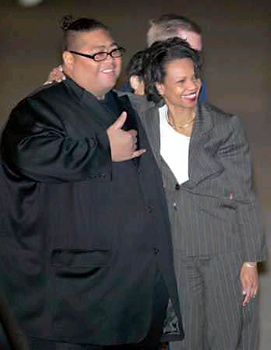Heavyweight meets heavyweight: American-born sumo star Konishiki, who uBlog has spotted before, warmly greeted Secretary of State Condoleezza Rice upon her arrival at Tokyo's Haneda Airport. Her second visit to Japan in as many months, Rice is to talk policy and progress, emphasizing the justifications for elevating the world's second-largest economy and third-largest navy to the United Nations Security Council.
Before landing on Honshu, Rice was in Islamabad and described for dictator and US ally Pervez Musharraf Pakistan's bright future in democratization:
"We did talk about the importance of democratic reforms in Pakistan, about getting on the road to democratic reforms that will in fact lead to free and fair elections in 2007," she told a joint press conference with Kasuri on Thursday.
With an eye to Beijing and Pyongyang, Rice will work to solidify the emerging American-Japanese alliance.
If such great attention is being paid to Tokyo, it is largely because the Japanese, steadfast in uncertain times, have done much to earn Washington's trust:
Italy's possible scale-down of its troops in Iraq will have no effect on Japan's deployment of 550 troops in the country, Prime Minister Junichiro Koizumi said today."Italy is Italy, Japan is Japan," Koizumi told reporters when asked if the prospect of a pullout by Rome could lead to a similar move by Tokyo. Japan has been a vocal supporter of the US-led military mission in Iraq and has dispatched 550 troop to the southern city of Samawah on a humanitarian operation in support of reconstruction.
Japan's realization of sovereignty is gradual but diligent, and showing promise:
The Self-Defense Forces should be formally recognized as military forces under strict civilian control and Japan's right to self-defense should be declared in a new constitution, according to the Liberal Democratic Party's latest recommendation released Monday....The LDP committee said the second paragraph of the article needs to be amended to recognize the SDF as military forces, while the first paragraph, which renounces war, should basically remain as it is now. ...The LDP committee, chaired by former Prime Minister Yoshiro Mori, is scheduled to draft its proposal for a new constitution in April, aiming to settle the debate by the end of the month.
Just a few years after Japanese Prime Minister Kinjuro Shidehara and Supreme Commander of Allied Powers Douglas MacArthur agreed upon Occupied Japan's pacifist constitution, Washington's "Reverse Course" policies armed the beaten Axis country anyway as the Cold War began. Though its armed forces have grown considerably, Japan's constitution must not so much reflect the country as it is but drive more deeply, and acknowledge the necessities of a liberal democracy in a world still habited by tyranny.
To that end, Tokyo is pursuing a closer economic and strategic relationship with New Delhi at a time when India may be working on its own community. It's a work in progress, this assembly of freedom, but in a good stride.
